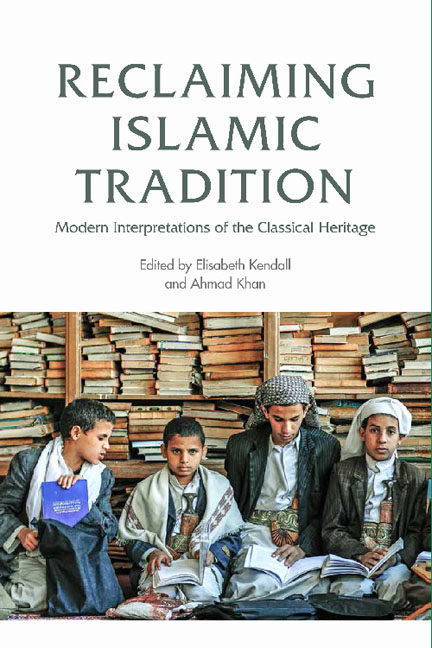Book contents
- Frontmatter
- Contents
- Acknowledgements
- About the Contributors
- Introduction
- 1 Modern Shiʿite Legal Theory and the Classical Tradition
- 2 Muḥammad Nāṣīr al-Dīn al-Albānī and Traditional Hadith Criticism
- 3 Islamic Tradition in an Age of Print: Editing, Printing and Publishing the Classical Heritage
- 4 Reaching into the Obscure Past: The Islamic Legal Heritage and Reform in the Modern Period
- 5 Reading Sūrat al-Anʿām with Muḥammad Rashīd Riḍā and Sayyid Quṣb
- 6 Contemporary Iranian Interpretations of the Qurʾan and Tradition on Women’s Testimony
- 7 Ibn Taymiyya Between Moderation and Radicalism
- 8 The Impact of a Sixteenth-Century Jihad Treatise on Colonial and Modern India
- 9 Jihadist Propaganda and its Exploitation of the Arab Poetic Tradition
- 10 Contemporary Salafi Literature on Paradise and Hell: The Case of ʿUmar Sulaymān al-Ashqar
- Index
7 - Ibn Taymiyya Between Moderation and Radicalism
Published online by Cambridge University Press: 11 November 2020
- Frontmatter
- Contents
- Acknowledgements
- About the Contributors
- Introduction
- 1 Modern Shiʿite Legal Theory and the Classical Tradition
- 2 Muḥammad Nāṣīr al-Dīn al-Albānī and Traditional Hadith Criticism
- 3 Islamic Tradition in an Age of Print: Editing, Printing and Publishing the Classical Heritage
- 4 Reaching into the Obscure Past: The Islamic Legal Heritage and Reform in the Modern Period
- 5 Reading Sūrat al-Anʿām with Muḥammad Rashīd Riḍā and Sayyid Quṣb
- 6 Contemporary Iranian Interpretations of the Qurʾan and Tradition on Women’s Testimony
- 7 Ibn Taymiyya Between Moderation and Radicalism
- 8 The Impact of a Sixteenth-Century Jihad Treatise on Colonial and Modern India
- 9 Jihadist Propaganda and its Exploitation of the Arab Poetic Tradition
- 10 Contemporary Salafi Literature on Paradise and Hell: The Case of ʿUmar Sulaymān al-Ashqar
- Index
Summary
Ibn Taymiyya (d. 1328) was one of the most incisive and controversial religious scholars in the middle period of the Islamic tradition, and his writings have been read and marshalled to diverse ends in the modern era. The Tunisian thinker Abū Yaʿrub al-Marzūqī (b. 1947) sees Ibn Taymiyya as a great philosopher heralding a modern philosophical nominalism, and the Pakistani intellectual and University of Chicago professor Fazlur Rahman (d. 1988) took Ibn Taymiyya as a model for his reformist modernism. The centrism (wasaṭiyya) of Qatarī-based scholar Yūsuf al-Qaraḍāwī (b. 1926) harks back to Ibn Taymiyya's advocacy of the golden mean (wasaṭ) in matters of doctrine, and al-Qaraḍāwī invokes Ibn Taymiyya in support of positive political engagement in a plural society, a pragmatic jurisprudence of balancing benefits and harms, and a strictly defensive approach to jihad against unbelievers. Moreover, Saudi Arabian Wahhābism;religious reform movements in nineteenth- and early twentieth-century Iraq, Syria, Yemen, India and Egypt; and the contemporary global Salafi phenomenon that originated in Saudi Arabia in the 1960s have all looked to Ibn Taymiyya for inspiration and appealed to his authority for legitimacy. Beyond this, Ibn Taymiyya is the main medieval Muslim authority cited by contemporary Muslim extremists, and the most forceful use of his writings for radical purposes is found in al-Farīḍa al-ghāʾiba (The Neglected Duty) by the electrician ʿAbd al-Salām Faraj (d. 1982). This treatise served to justify Islamic Jihad's assassination of Egyptian President Anwar Sadat in 1981. Faraj quotes Ibn Taymiyya's fatwas against the Mongols and his fatwa on the legal status of Mardin, a city today in southern Turkey, in the course of arguing that rulers who fail to uphold Islamic law are apostates and must be fought.
Faraj's interpretation of Ibn Taymiyya's fatwas has not gone uncontested, both in Egypt and beyond, and one particularly sophisticated counter- interpretation is found in the writings of Yahya Michot (b. 1952), currently a professor at Hartford Seminary in the USA. Michot argues vigorously that Faraj and his ilk are unfaithful to Ibn Taymiyya's intention, and, similar to al-Qaraḍāwī, he understands Ibn Taymiyya instead to be a moderate and pragmatic scholar who offers vision for Muslims seeking to live constructive and engaged lives in society, even in minority situations.
- Type
- Chapter
- Information
- Reclaiming Islamic TraditionModern Interpretations of the Classical Heritage, pp. 177 - 203Publisher: Edinburgh University PressPrint publication year: 2018



